AI in social media has marked a pivotal shift in how platforms operate and engage with users. This fusion of technology and social interaction has enhanced user experience and revolutionized platforms’ management and operational capabilities. AI’s ability to analyze, learn from, and act upon vast amounts of data in real time is at the core of this transformation.
1. AI Integration

AI in social media encompasses a wide range of applications, from content recommendation algorithms and personalized feeds to automated moderation and targeted advertising.
These systems rely on various branches of AI, including machine learning, natural language processing, and computer vision, to understand and predict user behavior, automate content curation, and ensure the safety and security of online spaces.
Machine learning algorithms are at the heart of content personalization.
They learn from each user’s interactions, preferences, and social networks to deliver a tailored content feed.
Natural language processing enables platforms to analyze textual content, understand sentiment, and facilitate better user interactions.
At the same time, computer vision is used to analyze images and videos, enriching the content discovery process and aiding in moderation efforts.
Transformative Impact on User Experience
The impact of AI on user experience is profound.
By delivering personalized content, AI makes social media platforms more engaging and relevant to individual users.
This personalization extends to advertisements, where AI’s predictive capabilities ensure that users see ads that are more likely to match their interests and needs.
Thus, AI enhances the user experience and increases ad efficiency.
Moreover, AI-powered chatbots and virtual assistants have transformed user interactions, providing instant support and facilitating smoother user experiences.
These AI applications enhance user satisfaction and drive engagement by keeping users connected and involved.
Transformative Impact on Platform Management
From a management perspective, AI has enabled social media platforms to more efficiently handle the enormous scale of content and interactions.
AI-driven moderation tools can automatically detect and act on inappropriate content, reducing the reliance on human moderators and speeding up response times.
This capability is crucial for maintaining a safe and welcoming online environment, especially as platforms grow in size and complexity.
AI also plays a critical role in analyzing user data to inform strategic decisions.
Through advanced analytics, platforms can gain insights into user behavior patterns, content engagement, and the effectiveness of features or campaigns.
This data-driven approach allows for more informed decision-making and strategy development, ensuring platforms remain dynamic and responsive to user needs.
Integrating AI into social media has undeniably transformed the user experience and platform management, making social platforms more personalized, efficient, and safe.
As AI technologies evolve, we can expect further innovations to enhance the social media landscape, making it more relevant, engaging, and accessible to users worldwide.
The journey of AI in social media is ongoing, with each advancement opening new possibilities for connection, understanding, and interaction in the digital age.
2. AI in Content Personalization and Recommendation
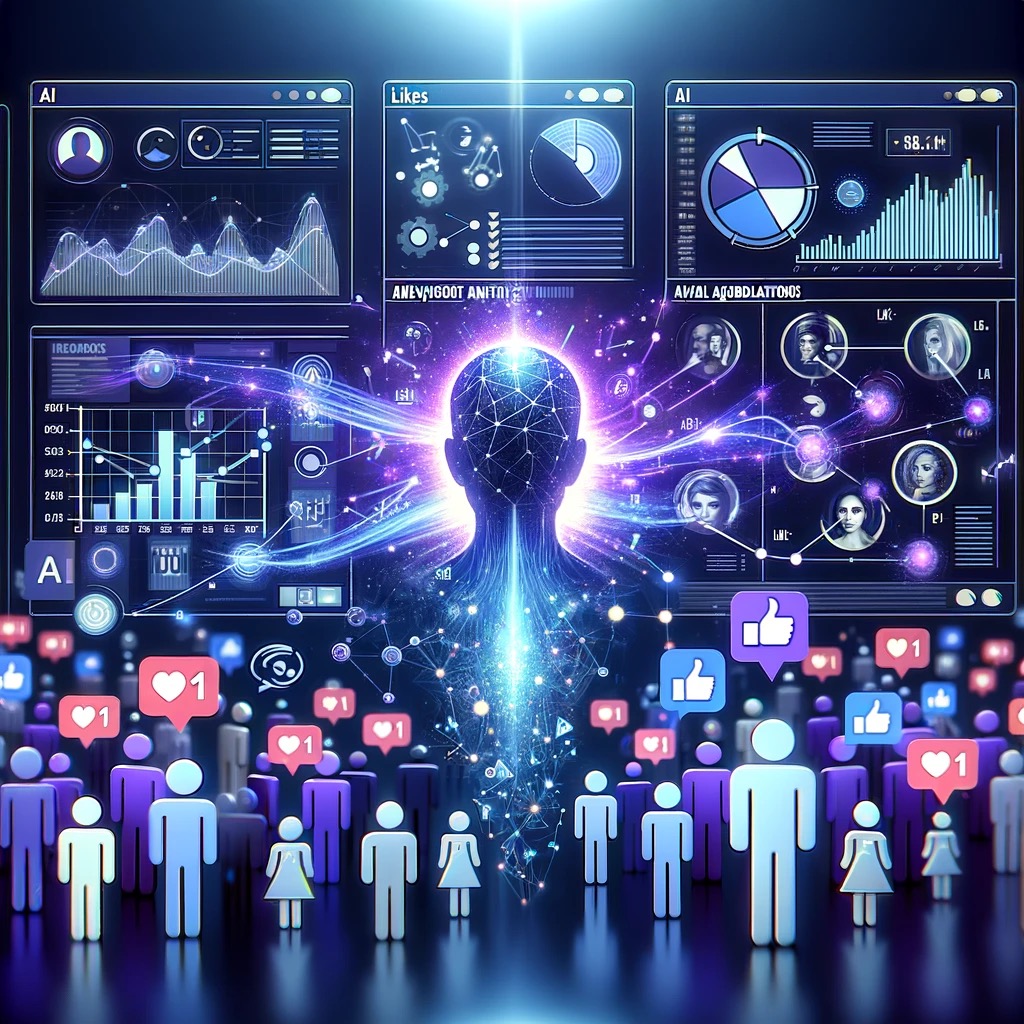
The role of Artificial Intelligence (AI) in content personalization and recommendation represents one of the most significant advancements in social media technology.
The Mechanism of Personalization and Recommendation
At the heart of content personalization and recommendation lies sophisticated AI algorithms that process vast amounts of data to understand individual user preferences, behaviors, and interactions.
These algorithms employ machine learning techniques, including deep learning and neural networks, to analyze user activity, such as the posts they like, share, comment on, and the time they spend on different types of content.
The goal is to create a unique and engaging user experience by delivering content that is most relevant and appealing to each user.
This involves understanding what content a user likes and predicting what they will find attractive in the future.
The algorithms continuously learn and adapt based on user feedback, ensuring the content recommendation remains dynamic and personalized.
Case Studies of AI-driven Personalization
- Facebook’s News Feed Algorithm: Facebook uses AI to rank posts in the News Feed, ensuring users see content most relevant to their interests at the top. The algorithm considers multiple factors, including the type of content (video, link, image, text), who posted it, and the interactions it has received, to predict how likely a user is to engage with a post.
- Instagram’s Explore Tab: Instagram’s Explore feature uses machine learning to tailor content suggestions based on user interactions with similar content. By analyzing likes, follows, and time spent on different posts, Instagram can surface content from accounts users don’t follow but might find interesting.
- TikTok’s For You Page: TikTok’s For You Page (FYP) is an example of AI-driven content recommendation at scale. The FYP personalizes real-time content based on user interactions, video information (such as captions and hashtags), and device/account settings. This personalized approach has been vital to TikTok’s rapid user engagement growth.
The Impact on User Experience and Platform Growth
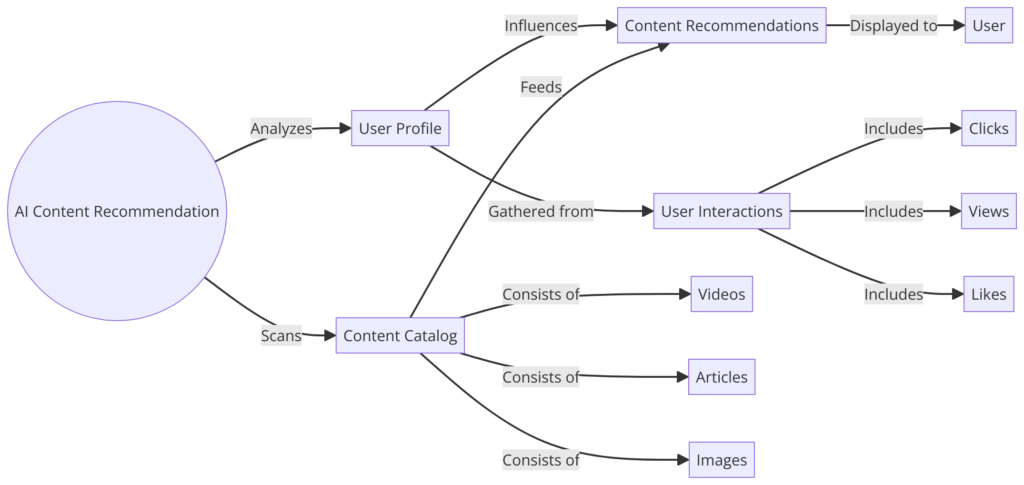
The implementation of AI in content personalization and recommendation has a profound impact on user experience.
By ensuring that users are presented with highly relevant and engaging content, social media platforms can increase user satisfaction, time spent on the platform, and overall engagement rates.
This enhances the user experience and contributes to platform growth and retention.
Personalized content recommendations also benefit content creators and advertisers by increasing their content’s visibility to the most relevant audiences, thereby improving engagement rates and the effectiveness of advertising campaigns.
Challenges and Considerations
While AI-driven personalization offers numerous benefits, it also poses challenges, including the potential for creating echo chambers or reinforcing bias.
Ensuring diversity in content recommendation and protecting user privacy are ongoing concerns that platforms must address to maintain trust and a positive user experience.
AI’s role in content personalization and recommendation has undeniably transformed social media platforms, making them more user-centric and engaging.
By leveraging sophisticated AI algorithms, platforms can deliver personalized content experiences at scale, fostering greater user engagement and satisfaction.
As AI technology continues to evolve, so too will social media platforms’ capabilities to offer even more tailored and interactive content, shaping the future of digital social interactions.
3. AI in User Engagement and Interaction Analysis

The utilization of Artificial Intelligence (AI) to analyze user engagement and optimize interactions on social media platforms marks a significant evolution in how these platforms understand and influence user behavior.
Leveraging AI for User Engagement Analysis
AI technologies, particularly machine learning and data analytics, are instrumental in dissecting vast amounts of user data to unveil patterns, trends, and insights into how users engage with content.
By analyzing metrics such as click-through rates, time spent on content, shares, likes, and comments, AI algorithms can identify what content resonates most with users, predict future engagement behaviors, and suggest content strategies that are more likely to increase user interaction and retention.
These AI systems can segment users into groups based on engagement patterns and preferences, allowing for more targeted and effective content strategies.
This segmentation enables platforms and marketers to personalize content at an individual level and for similar user cohorts, enhancing the relevance and impact of their messaging.
Optimizing Interactions with AI Tools
AI tools also play a crucial role in optimizing user interactions by providing insights into the best times to post content, the most effective content types, and how to tailor messaging to engage different audiences.
For example, predictive analytics can forecast peak engagement periods, enabling content creators and marketers to schedule posts for maximum visibility and interaction.
Furthermore, AI-driven chatbots and virtual assistants enhance user interaction by responding immediately to inquiries, facilitating seamless customer service, and engaging users in personalized conversations.
These tools can handle various tasks, from answering frequently asked questions to recommending products, significantly improving the user experience and fostering engagement.
Examples of AI Enhancing Social Media Marketing
- Sentiment Analysis for Brand Monitoring: AI tools capable of sentiment analysis can monitor social media conversations about a brand or product, providing insights into public perception and sentiment. This information helps brands adjust their strategies in real-time, address concerns, and capitalize on positive sentiment.
- Predictive Analytics for Content Strategy: Platforms like Twitter and LinkedIn use AI to analyze user behavior and engagement patterns, helping marketers understand which types of content are likely to perform best. This predictive capability allows for more strategic content planning and targeted advertising campaigns.
- Personalized Recommendations for Increased Engagement: Spotify’s Discover Weekly playlist is an excellent example of using AI to analyze user listening habits and recommend new songs and artists. While not a traditional social media platform, Spotify’s approach demonstrates how personalized recommendations drive engagement by introducing users to content they are likely to enjoy but haven’t yet discovered.
Challenges in AI-driven Engagement
While AI offers powerful tools for analyzing and enhancing user engagement, challenges include ensuring data privacy, avoiding algorithmic bias, and maintaining the authenticity of interactions.
Platforms must navigate these challenges carefully to leverage AI effectively while respecting user rights and preferences.
AI’s role in analyzing user engagement and optimizing interactions is pivotal for the ongoing evolution of social media platforms.
By harnessing AI’s analytical and predictive capabilities, platforms can offer more engaging and personalized user experiences, driving engagement and fostering more profound connections.
As AI technology advances, its application in user engagement analysis and interaction optimization is set to become even more sophisticated, offering exciting possibilities for the future of social media marketing and user engagement strategies.
4. AI in Content Moderation and Security

The application of Artificial Intelligence (AI) in content moderation and security is critical to maintaining safe, respectful, and inclusive online environments on social media platforms.
The Role of AI in Content Moderation
AI technologies, including machine learning models and natural language processing (NLP), are pivotal in automating the detection of inappropriate or harmful content.
These AI systems are trained on vast datasets to identify unacceptable content, such as hate speech, harassment, misinformation, and explicit material.
AI moderators can quickly flag and remove content that violates platform policies by analyzing text, images, and videos, significantly reducing users’ exposure to harmful material.
One of AI’s primary advantages in content moderation is its ability to operate at scale, processing millions of posts, comments, and media files daily.
This scalability is crucial for large social media platforms, where human moderation alone cannot keep pace with the volume of content generated by users.
Innovations in AI for Maintaining a Safe Online Environment
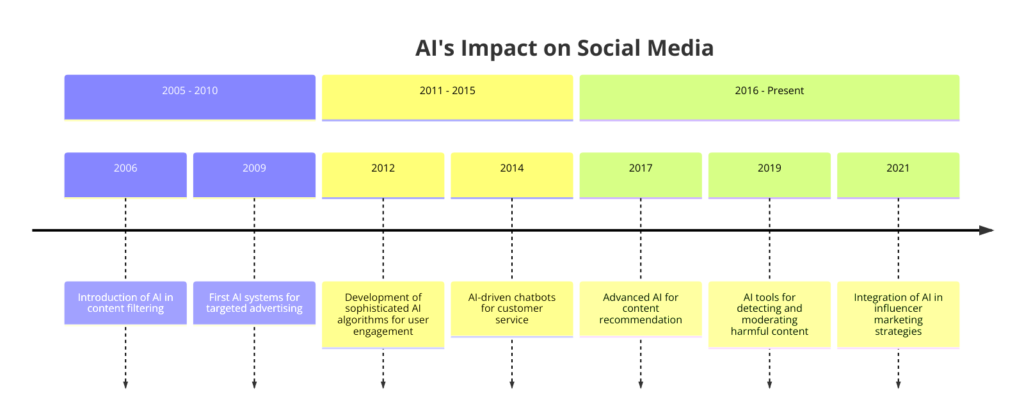
Innovations in AI moderation technologies are continually emerging and aim to improve accuracy and the ability to understand context. Advances include:
- Deep Learning and Contextual Analysis: Enhancements in deep learning models enable a more nuanced understanding of content, considering the context and subtleties of language that may indicate sarcasm, satire, or cultural references. This helps reduce false positives and ensures that content moderation decisions align more with human judgment.
- Real-Time Moderation: AI systems are increasingly capable of moderating content in real-time, preventing the spread of harmful content before it reaches a broad audience. This is particularly important for live broadcasts, where immediate moderation can control the dissemination of violence or other inappropriate activities.
- User Behavior Analysis: In addition to analyzing content, AI is also used to monitor user behavior patterns, identifying potential harassers or malicious accounts based on their activity. This proactive approach helps platforms take preemptive action against individuals or groups threatening the safety and integrity of the online community.
Challenges in AI-Driven Content Moderation
Despite these advances, AI-driven content moderation faces challenges, including maintaining accuracy across different languages and cultures and managing the nuances of context.
Ensuring AI systems do not inadvertently censor legitimate expression while effectively identifying harmful content requires ongoing refinement and human oversight.
Moreover, the reliance on AI for content moderation raises concerns about transparency and accountability, particularly in decisions that impact freedom of expression.
Balancing AI’s efficiency and scalability with the need for human judgment and sensitivity remains a critical issue for social media platforms.
AI’s role in content moderation and security is indispensable for creating and maintaining safe online environments on social media platforms.
Through continuous innovation and improvement, AI technologies are becoming more adept at identifying and mitigating inappropriate content, contributing to digital communities’ overall health and safety.
However, human communication and behavior complexities necessitate a careful balance between automated moderation and human oversight.
As AI technologies evolve, so will the strategies for leveraging them in safeguarding the integrity and security of social media platforms, ensuring they remain spaces for positive and respectful interaction.
5. AI in Predictive Analytics and Trend Forecasting
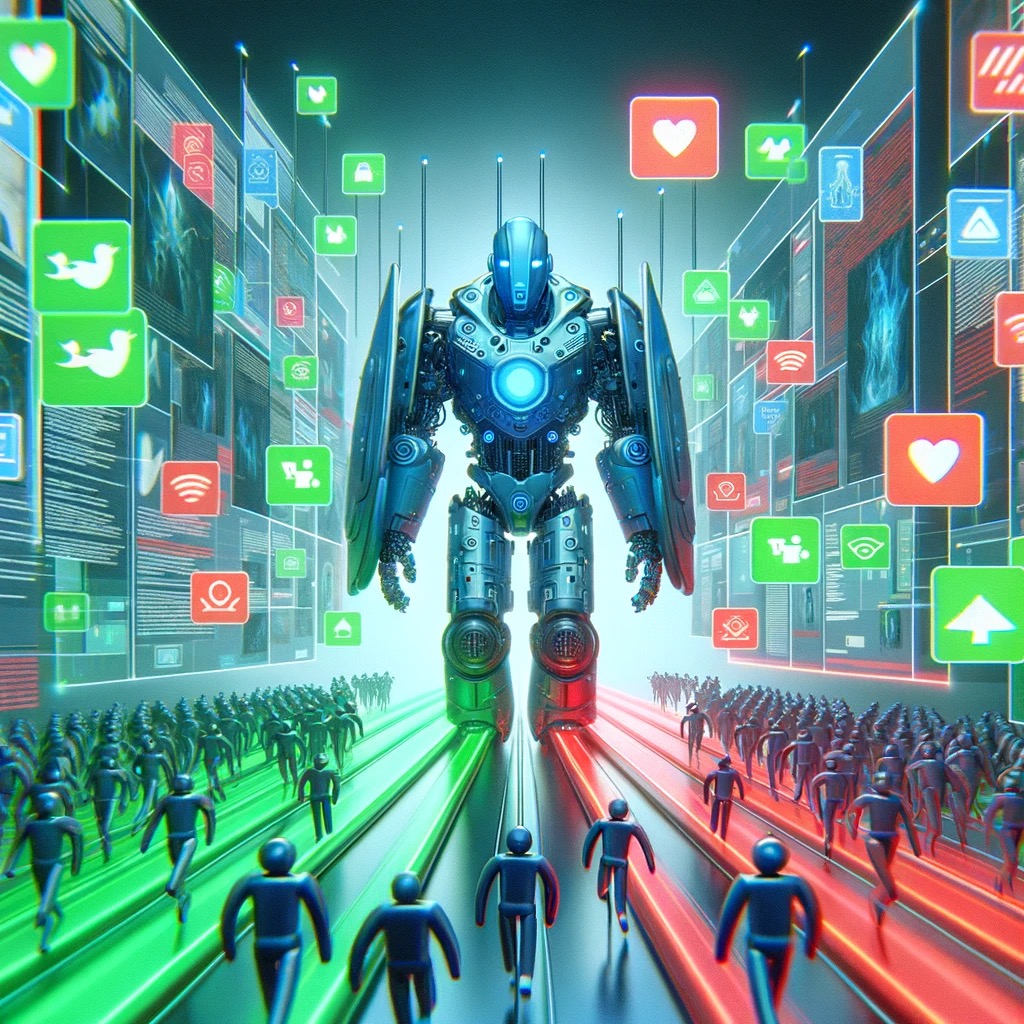
The application of Artificial Intelligence (AI) in predictive analytics and trend forecasting is transforming how social media platforms and businesses understand and anticipate user behavior and market trends.
Application of AI in Predicting Trends
AI algorithms, particularly those based on machine learning and data mining, analyze historical and real-time data to identify patterns and predict future trends.
These algorithms can process vast datasets from social media interactions, such as likes, shares, comments, and engagement times, to forecast which topics, hashtags, or content types will likely gain popularity.
This predictive capability is invaluable for content creators, marketers, and platform operators, enabling them to stay ahead of trends and tailor their strategies accordingly.
Predictive analytics in social media can also extend to user behavior, predicting potential churn rates, engagement spikes, and the likelihood of users engaging with specific content types.
This insight allows platforms and businesses to optimize engagement strategies, improve user retention, and tailor content to meet anticipated interests.
AI’s Role in Strategic Planning and Marketing
AI-driven trend forecasting plays a crucial role in strategic planning and marketing campaigns.
By identifying emerging trends and predicting their trajectory, businesses can align their marketing strategies to capitalize on them, ensuring their content and campaigns resonate with their target audience.
This proactive approach can significantly enhance the effectiveness of marketing efforts, driving engagement and increasing conversion rates.
For instance, AI can help brands identify emerging consumer needs or sentiment shifts on social media, guiding the development of new products or services.
Additionally, AI-driven insights can optimize ad targeting and content personalization, ensuring that marketing messages reach the most receptive audiences at reasonable times.
Examples of AI in Action
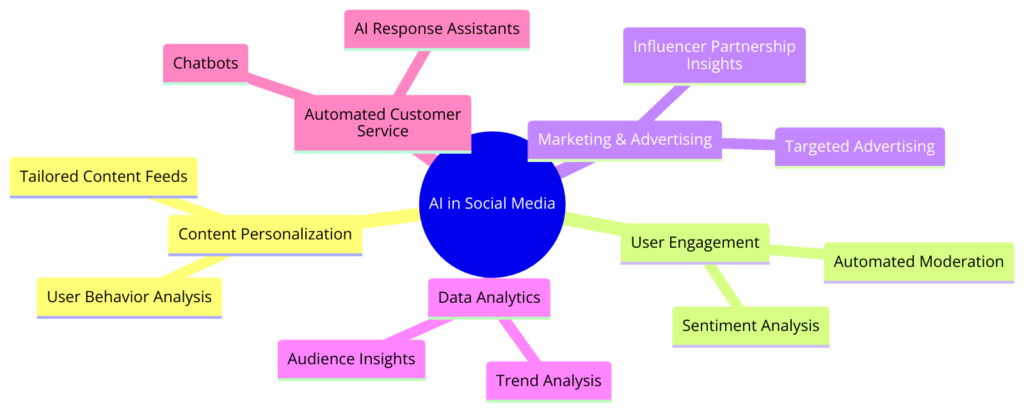
- Fashion and Retail: AI tools analyze social media data to identify emerging fashion trends, consumer preferences, and sentiment toward brands. This information helps retailers stock up on trending items and tailor their marketing messages to appeal to consumer preferences.
- Entertainment and Media: Streaming services use AI to analyze social media buzz and viewing patterns, helping them predict which genres or titles will be popular. This insight guides content acquisition and original production decisions.
- Finance and Investment: In the financial sector, AI analyzes social media sentiment and trends to forecast market movements and identify investment opportunities. This real-time analysis can provide investors with a competitive edge.
Challenges and Considerations
While AI in predictive analytics and trend forecasting offers significant advantages, it also presents challenges, including data privacy concerns, prediction accuracy, and the potential for reinforcing biases.
Ensuring the ethical use of data and maintaining transparency in how AI models make predictions are crucial for building trust and reliability.
AI’s role in predictive analytics and trend forecasting is reshaping social media and digital marketing.
By leveraging AI to analyze data and predict trends, businesses, and platforms can stay ahead of the curve, tailor their strategies to meet user demands and optimize engagement efforts.
As AI technologies evolve, their application in predictive analytics will undoubtedly expand, offering even more sophisticated insights and opportunities for innovation in strategic planning and marketing campaigns.
6. Challenges and Ethical Considerations in AI and Social Media
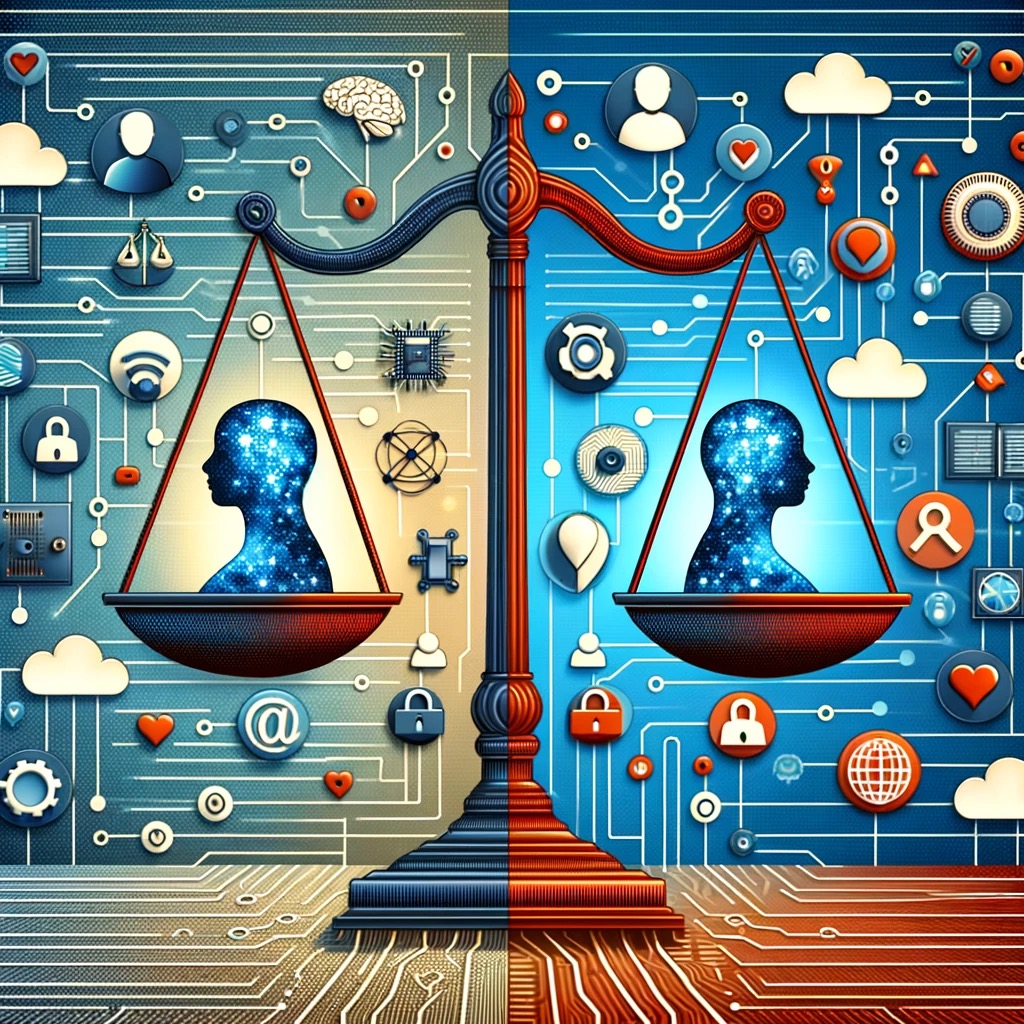
Integrating Artificial Intelligence (AI) into social media brings transformative advancements, significant challenges, and ethical considerations.
Privacy Concerns and Data Security
One of the primary challenges in implementing AI in social media is the handling of user data.
AI systems require vast data to train algorithms and deliver personalized experiences, raising concerns about user privacy and data security.
The collection, storage, and analysis of personal information must be managed responsibly, with explicit consent from users and adherence to global data protection regulations like the GDPR in Europe.
Ensuring data security against breaches is also critical, as AI systems that analyze and store sensitive information become attractive targets for cyberattacks.
Platforms must implement robust security measures to protect user data and maintain trust.
Addressing Data Biases
AI algorithms can inadvertently perpetuate and amplify biases present in the training data.
Social media platforms are diverse spaces, and if not carefully managed, AI systems might reinforce stereotypes or provide skewed content recommendations.
This issue is particularly concerning in content moderation, where biased algorithms could unfairly censor certain groups or viewpoints.
Mitigating these biases requires a concerted effort in dataset curation, algorithmic transparency, and continuous monitoring of AI systems to identify and correct biases.
Including diverse perspectives in AI systems’ development and training phases is essential for reducing bias.
Ethical Implications and Accountability
The ethical implications of AI in social media extend beyond privacy and bias to include questions of accountability, transparency, and the potential for manipulation.
For instance, AI-driven content recommendations could lead to echo chambers, where users are only exposed to viewpoints similar to their own, potentially polarizing public discourse.
Platforms must navigate these ethical waters carefully, ensuring that AI systems are transparent in their operations and decisions and that users have control over their data and the content they are exposed to.
Moreover, there should be clear accountability for AI-driven decisions, with mechanisms for users to appeal or question actions taken by algorithms.
Balancing AI Innovation with User Rights
As social media platforms continue to innovate with AI, finding a balance between leveraging AI for enhanced user experiences and protecting user rights becomes paramount.
This balance involves addressing the technical and ethical challenges mentioned and engaging with users, regulators, and experts in an ongoing dialogue about the future of AI in social media.
The development and deployment of AI technologies must be guided by ethical principles prioritizing user welfare, fairness, and privacy.
This includes transparently communicating how AI systems use data, offering users meaningful control over their digital experiences, and ensuring that AI advancements contribute positively to society.
The challenges and ethical considerations in AI and social media underscore the need for careful, responsible innovation.
Addressing these issues requires a multifaceted approach that includes robust privacy protections, efforts to eliminate biases, adherence to ethical standards, and a commitment to transparency and accountability.
As AI evolves, the social media landscape must adapt, ensuring that technological advancements enhance user experiences without compromising ethical values or individual rights.
The future of AI in social media lies in the balance between harnessing the potential of AI for good while vigilantly guarding against its potential pitfalls.
7. The Future of AI in Social Media

The future of artificial intelligence (AI) in social media is poised for significant evolution, with emerging trends and advancements expected to transform further how platforms operate and engage with users. Predictions for AI Technologies in Social Media
- Enhanced Personalization and Immersive Experiences: Future AI technologies will likely offer even more sophisticated personalization, tailoring user experiences to their expressed preferences, inferred emotional states, and situational contexts. This could extend to creating immersive experiences through augmented reality (AR) and virtual reality (VR), allowing users to engage with content and each other in dynamic, three-dimensional spaces.
- Advanced Content Creation and Curation Tools: AI is expected to play a more significant role in content creation, providing tools that assist users in effortlessly generating high-quality, engaging content. From automatic video editing to real-time language translation, these tools will lower barriers to content creation and enable more diverse voices to be heard on global platforms.
- Ethical AI and Enhanced Privacy Protections: As awareness of privacy concerns and ethical considerations grows, future developments in AI will likely emphasize ethical AI practices and enhanced privacy protections. This includes transparent AI operations, user control over data, and AI systems designed to respect user privacy and promote inclusivity.
- AI for Social Good: There’s a growing trend towards leveraging AI for social good within social media ecosystems. This includes using AI to support mental health initiatives, facilitate educational opportunities, and foster community support networks. AI technologies will be increasingly employed to identify and support users in need, promoting positive societal impact.
- Improved Content Moderation and Security: AI’s role in content moderation and platform security is expected to become more nuanced and compelling. Future advancements may involve AI systems capable of understanding complex cultural and contextual nuances, reducing false positives in content moderation, and better protecting users from harmful content and behaviors.
- Decentralized Social Media Platforms: Integrating AI with blockchain technology could lead to decentralized social media platforms that offer greater transparency, security, and user control. AI could manage content curation, moderation, and personalization in a decentralized environment, potentially revolutionizing the structure and governance of social media platforms.
Emerging Trends and Potential Advancements
One emerging trend is using AI to combat misinformation and fake news. AI can help identify and flag dubious content by analyzing patterns and credibility signals, supporting efforts to maintain trustworthy information ecosystems.
Another area of advancement is natural language understanding (NLU) and generation (NLG), which enable AI systems to participate in or facilitate more complex, naturalistic user interactions.
This could revolutionize customer service, community management, and interactive experiences on social media platforms.
The future of AI in social media holds immense promise, with advancements poised to create more personalized, immersive, and secure online environments.
As AI technologies evolve, they offer the potential to enrich social media experiences, foster creativity, and address critical challenges such as misinformation and online safety.
However, realizing this potential requires a continued focus on ethical AI development, user privacy, and inclusivity.
As we look towards the future, the collaboration between AI developers, social media platforms, and the broader community will be vital to harnessing AI’s capabilities while navigating its challenges, ensuring that social media continues to serve as a platform for positive, meaningful connections.
8. Conclusion: The Critical Role of AI in Shaping the Future of Social Media
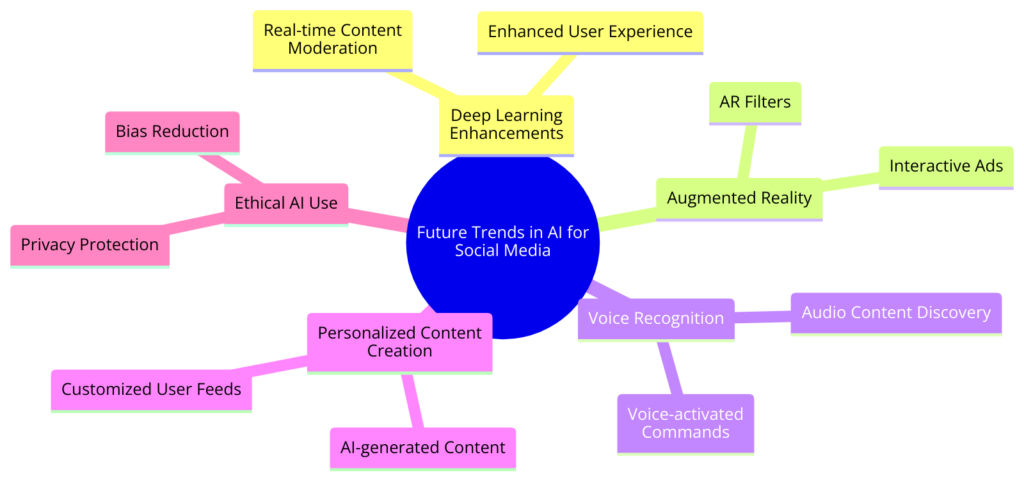
Integrating Artificial Intelligence (AI) into social media has fundamentally transformed the digital communication landscape, offering unprecedented personalization, engagement, and content management opportunities.
As we have explored through various sections, from content personalization and recommendation to predictive analytics, AI’s influence spans the entirety of the social media ecosystem, reshaping how platforms operate and how users interact within these digital spaces.
AI has proven to be a powerful tool for enhancing user experiences, providing personalized content feeds, facilitating more meaningful interactions, and ensuring the safety and security of online communities.
Through sophisticated algorithms and machine learning models, social media platforms can now understand user preferences and behaviors individually, tailoring content and advertisements to match user interests and fostering a more engaging and satisfying online experience.
Moreover, AI’s role in content moderation and security has been invaluable in maintaining the integrity and safety of social media platforms.
By automating the detection and moderation of inappropriate content, AI helps safeguard users from harmful experiences and ensures that social media remains a space for positive interaction and expression.
However, the journey of integrating AI into social media has its challenges.
Privacy concerns, data biases, and ethical considerations remain at the forefront of the conversation, highlighting the need for responsible AI development and deployment.
Balancing the benefits of AI with the protection of user rights and ethical standards is crucial for the continued success and acceptance of AI technologies in social media.
Looking towards the future, AI is set to play an even more significant role in social media. Emerging trends and advancements promise to further enhance personalization, improve content moderation, and unlock new opportunities for user engagement.
AI’s potential to contribute to social good, support mental health, and foster community engagement represents an exciting frontier for social media platforms.
In conclusion, AI’s critical role in shaping the future of social media cannot be understated.
Its capabilities to analyze, predict, and personalize at scale offer tremendous opportunities for innovation and improvement in the social media experience.
Encouraging ongoing innovation in AI technologies while ensuring responsible use and adherence to ethical standards will be vital to maximizing the benefits of AI for social media users and society at large.
As we move forward, the collaborative efforts of technologists, ethicists, and users will be vital in navigating the challenges and unlocking the full potential of AI in social media, ensuring a future where digital platforms continue to serve as powerful tools for connection, expression, and understanding.
FAQ & Answers
How is AI used in social media?
AI is used for content personalization, user engagement analysis, content moderation, predictive analytics, and enhancing overall user experience on social media platforms.
2. What are the challenges of implementing AI in social media?
Challenges include managing data privacy, addressing algorithmic biases, and ensuring ethical use of AI in content moderation and user interaction.
Quizzes
Quiz 1: “AI in Social Media” – Identify the AI technologies used in various social media scenarios.
For a quiz on “AI in Social Media,” we’ll explore various AI technologies and how they are applied in different scenarios within social media platforms. This will help illustrate the depth of AI integration into enhancing user experiences, content moderation, and targeted advertising.
AI Technologies:
- Machine Learning (ML)
- Natural Language Processing (NLP)
- Computer Vision
- Deep Learning (DL)
- Reinforcement Learning
- Predictive Analytics
- Sentiment Analysis
Social Media Scenarios:
A) Content Personalization: Customizing the user experience by suggesting relevant content based on past interactions.
B) Automated Moderation: Using algorithms to detect and remove inappropriate or harmful content.
C) Targeted Advertising: Delivering ads to users based on their behavior, preferences, and demographic data.
D) Chatbots for Customer Service: Providing automated responses to user inquiries on social media platforms.
E) Trend Analysis: Identifying and predicting popular topics and hashtags.
F) Image and Video Analysis: Automatically tagging people and objects in photos and videos.
G) Emotion and Sentiment Detection: Analyzing user comments and posts to gauge public sentiment and emotional responses.
Matches:
- Machine Learning (ML): E) Trend Analysis – ML algorithms can analyze vast amounts of data to identify emerging trends and patterns.
- Natural Language Processing (NLP): D) Chatbots for Customer Service – NLP enables chatbots to understand and respond to human language effectively.
- Computer Vision: F) Image and Video Analysis – Computer vision technologies are used to recognize and label visual content automatically.
- Deep Learning (DL): B) Automated Moderation – DL models, particularly convolutional neural networks, are effective for identifying inappropriate content based on image and text analysis.
- Reinforcement Learning: C) Targeted Advertising – Reinforcement learning algorithms improve ad targeting by continuously adapting to user responses.
- Predictive Analytics: A) Content Personalization – Predictive analytics use historical data to predict and suggest content that users are likely to enjoy.
- Sentiment Analysis: G) Emotion and Sentiment Detection – Sentiment analysis tools evaluate the tone and emotional content of user posts and comments.
These matches demonstrate how different AI technologies are applied across various aspects of social media, from enhancing user interactions to improving content relevance and safety. This integration helps social media platforms manage large volumes of data and interactions more effectively.
Quiz 2: “Social Media Innovations” – A quiz on recent AI breakthroughs in social media platforms
For a quiz on recent AI breakthroughs in social media platforms, I’ll present questions that focus on innovative applications and the deployment of artificial intelligence technologies which are transforming user experience, content management, and engagement strategies on these platforms.
Question 1: AI-Driven Content Personalization
How does AI-driven content personalization enhance user experience on social media platforms? A) By restricting the content users can create.
B) By dynamically adjusting content feeds to user preferences based on interaction history.
C) By limiting the exposure to new content types.
D) By promoting only the most popular content regardless of user interest.
Question 2: Deep Learning in Image Recognition
What advancement has deep learning made in the field of image recognition on social media?
A) It has eliminated the need for images on social platforms.
B) It enables automatic tagging and categorization of images and videos at scale.
C) It focuses on reducing image resolution to speed up loading times.
D) It prohibits the use of images to ensure text-based interactions.
Question 3: Natural Language Processing for Chatbots
What is a significant application of NLP in chatbots on social media?
A) To generate random responses to user queries.
B) To disable all user interactions.
C) To enable chatbots to provide context-aware, intelligent responses and improve engagement.
D) To ensure chatbots only use pre-written scripts without adaptation.
Question 4: Real-Time Sentiment Analysis
What role does real-time sentiment analysis play in social media management?
A) It is used to archive all user posts without analysis.
B) It helps platforms instantly gauge user reactions to content and adjust strategies accordingly.
C) It serves to delete all negative feedback automatically.
D) It focuses solely on positive feedback, ignoring any critical inputs.
Question 5: Predictive Analytics in Trend Forecasting
How does predictive analytics aid social media platforms in trend forecasting?
A) By predicting exactly when the platform will fail.
B) By analyzing past and current data trends to forecast future content trends and user behavior.
C) By focusing solely on outdated trends to maintain status quo.
D) By ignoring current trends and focusing only on historical data.
Question 6: Automated Moderation Using AI
What improvement does AI bring to automated content moderation on social media?
A) It has led to the removal of all user-generated content.
B) It has enabled the indiscriminate blocking of accounts.
C) It utilizes complex algorithms to detect and act on inappropriate content more efficiently.
D) It encourages the spread of misinformation to test user discernment.
Question 7: AI for Enhanced Targeted Advertising
What is the benefit of AI-enhanced targeted advertising on social media?
A) To increase the cost of advertising for all businesses.
B) To deliver highly relevant ads to users based on detailed analysis of their activities and preferences.
C) To decrease advertising relevance by generalizing user data.
D) To remove all forms of advertising from social media.
These questions underscore the cutting-edge developments in AI technology across social media platforms, highlighting their impacts on content management, user interaction, and business strategies. These innovations have vastly improved the efficiency and effectiveness of social media services.
Here are the answers to the quiz on recent AI breakthroughs in social media platforms:
Question 1: AI-Driven Content Personalization
Correct Answer: B) By dynamically adjusting content feeds to user preferences based on interaction history. AI-driven content personalization enhances user experience by continuously learning from interactions to tailor content feeds, making them more relevant and engaging for individual users.
Question 2: Deep Learning in Image Recognition
Correct Answer: B) It enables automatic tagging and categorization of images and videos at scale. Deep learning significantly improves the efficiency and accuracy of image recognition on social media, facilitating features like automatic tagging of photos and videos, which enhances user engagement and content discoverability.
Question 3: Natural Language Processing for Chatbots
Correct Answer: C) To enable chatbots to provide context-aware, intelligent responses and improve engagement. NLP allows chatbots on social media to understand and respond to user queries in a context-aware manner, thereby improving user interaction and providing personalized assistance.
Question 4: Real-Time Sentiment Analysis
Correct Answer: B) It helps platforms instantly gauge user reactions to content and adjust strategies accordingly. Real-time sentiment analysis plays a crucial role in social media management by enabling platforms to understand and react to user emotions and sentiments toward content instantly, aiding in better content strategy adjustments.
Question 5: Predictive Analytics in Trend Forecasting
Correct Answer: B) By analyzing past and current data trends to forecast future content trends and user behavior. Predictive analytics helps social media platforms anticipate future trends and user behaviors by analyzing existing data, allowing for proactive content and marketing strategy planning.
Question 6: Automated Moderation Using AI
Correct Answer: C) It utilizes complex algorithms to detect and act on inappropriate content more efficiently. AI improves automated moderation by using sophisticated algorithms to quickly identify and take action against inappropriate or harmful content, maintaining a safer online environment for users.
Question 7: AI for Enhanced Targeted Advertising
Correct Answer: B) To deliver highly relevant ads to users based on detailed analysis of their activities and preferences. AI-enhanced targeted advertising benefits social media platforms by using detailed user data to serve highly relevant advertisements, improving user experience and increasing ad effectiveness.
These answers highlight the transformative impact of AI technologies across various aspects of social media, from enhancing personalization and user interaction to improving content moderation and advertising strategies.